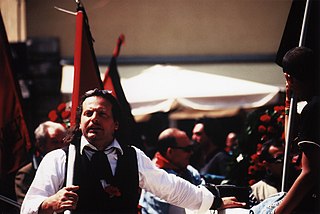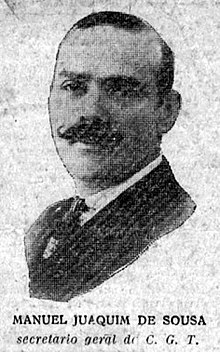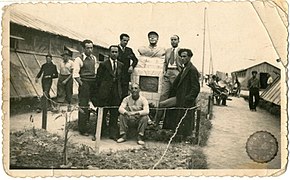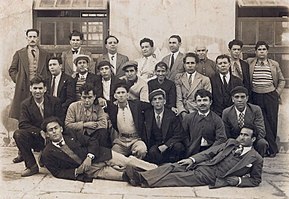Anarcho-syndicalism is a political philosophy and anarchist school of thought that views revolutionary industrial unionism or syndicalism as a method for workers in capitalist society to gain control of an economy and thus control influence in broader society. The end goal of syndicalism is to abolish the wage system, regarding it as wage slavery. Anarcho-syndicalist theory generally focuses on the labour movement. Reflecting the anarchist philosophy from which it draws its primary inspiration, anarcho-syndicalism is centred on the idea that power corrupts and that any hierarchy that cannot be ethically justified must be dismantled.

The Iberian Anarchist Federation is a Spanish organization of anarchist militants active within affinity groups in the Confederación Nacional del Trabajo (CNT) anarcho-syndicalist union. It is often abbreviated as CNT-FAI because of the close relationship between the two organizations. The FAI publishes the periodical Tierra y Libertad.
Anarchism in Spain has historically gained some support and influence, especially before Francisco Franco's victory in the Spanish Civil War of 1936–1939, when it played an active political role and is considered the end of the golden age of classical anarchism.

The Zabalaza Anarchist Communist Front, formerly known as the Zabalaza Anarchist Communist Federation (ZabFed), is a platformist–especifista anarchist political organisation in South Africa, based primarily in Johannesburg. The word zabalaza means "struggle" or "active rebellion" in isiZulu, isiXhosa, siSwati and isiNdebele. Initially, as ZabFed, it was a federation of pre-existing collectives, mainly in Soweto and Johannesburg. It is now a unitary organisation based on individual applications for membership, describing itself as a "federation of individuals". Historically the majority of members have been people of colour. Initially the ZACF had sections in both South Africa and Swaziland. The two sections were split in 2007, but the Swazi group faltered in 2008. Currently the ZACF also recruits in Zimbabwe. Members have experienced oppression in South Africa and Swaziland.

Sébastien Faure was a French anarchist, convicted sex offender, freethought and secularist activist and a principal proponent of synthesis anarchism.

Anarchism in France can trace its roots to thinker Pierre-Joseph Proudhon, who grew up during the Restoration and was the first self-described anarchist. French anarchists fought in the Spanish Civil War as volunteers in the International Brigades. According to journalist Brian Doherty, "The number of people who subscribed to the anarchist movement's many publications was in the tens of thousands in France alone."

Anarchism was an influential contributor to the social politics of Brazil's Old Republic. During the epoch of mass migrations of European labourers at the end of the nineteenth and the beginning of the twentieth century, anarchist ideas started to spread, particularly amongst the country’s labour movement. Along with the labour migrants, many Italian, Spanish, Portuguese and German political exiles arrived, many holding anarchist or anarcho-syndicalist ideas.

The Argentine anarchist movement was the strongest such movement in South America. It was strongest between 1890 and the start of a series of military governments in 1930. During this period, it was dominated by anarchist communists and anarcho-syndicalists. The movement's theories were a hybrid of European anarchist thought and local elements, just as it consisted demographically of both European immigrant workers and native Argentines.

Joan Peiró i Belis was a Catalan anarchist activist, writer, editor of the anarchist newspaper Solidaridad Obrera, two-time Secretary General of the Confederación Nacional del Trabajo and Minister of Industry of the Spanish government during the Spanish Civil War.
Contemporary anarchism within the history of anarchism is the period of the anarchist movement continuing from the end of World War II and into the present. Since the last third of the 20th century, anarchists have been involved in anti-globalisation, peace, squatter and student protest movements. Anarchists have participated in armed revolutions such as in those that created the Makhnovshchina and Revolutionary Catalonia, and anarchist political organizations such as the International Workers' Association and the Industrial Workers of the World have existed since the 20th century. Within contemporary anarchism, the anti-capitalism of classical anarchism has remained prominent.
Individualist anarchism in Europe proceeded from the roots laid by William Godwin and soon expanded and diversified through Europe, incorporating influences from individualist anarchism in the United States. Individualist anarchism is a tradition of thought within the anarchist movement that emphasize the individual and his or her will over external determinants such as groups, society, traditions, and ideological systems. While most American individualist anarchists advocate mutualism, a libertarian socialist form of market socialism, or a free-market socialist form of classical economics, European individualist anarchists are pluralists who advocate anarchism without adjectives and synthesis anarchism, ranging from anarcho-communist to mutualist economic types.
Anarcho-naturism, also referred to as anarchist naturism and naturist anarchism, appeared in the late 19th century as the union of anarchist and naturist philosophies. In many of the alternative communities established in Britain in the early 1900s, "nudism, anarchism, vegetarianism and free love were accepted as part of a politically radical way of life". In the 1920s, the inhabitants of the anarchist community at Whiteway, near Stroud in Gloucestershire, "shocked the conservative residents of the area with their shameless nudity". Mainly, it had importance within individualist anarchist circles in Spain, France, Portugal and Cuba.
Anarchism in Venezuela has historically played a fringe role in the country's politics, being consistently smaller and less influential than equivalent movements in much of the rest of South America. It has, however, had a certain impact on the country's cultural and political evolution.
Libertarian possibilism was a political current in early-20th-century Spanish anarchism that advocated achieving the anarchist ends of ending the state and capitalism by participation in structures of contemporary parliamentary democracy. The name of the political position appeared for the first time between 1922 and 1923 within the discourse of the Catalan anarcho-syndicalist Salvador Seguí when he said, "We have to intervene in politics in order to take over the positions of the bourgeoisie".

The anarchist movement in Chile emerged from European immigrants, followers of Mikhail Bakunin affiliated with the International Workingmen's Association, who contacted Manuel Chinchilla, a Spaniard living in Iquique. Their influence could be perceived at first within the labour unions of typographers, painters, builders and sailors. During the first decades of the 20th century, anarchism had a significant influence on the labour movement and intellectual circles of Chile. Some of the most prominent Chilean anarchists were: the poet Carlos Pezoa Véliz, the professor Dr Juan Gandulfo, the syndicalist workers Luis Olea, Magno Espinoza, Alejandro Escobar y Carballo, Ángela Muñoz Arancibia, Juan Chamorro, Armando Triviño and Ernesto Miranda, the teacher Flora Sanhueza, and the writers José Domingo Gómez Rojas, Fernando Santiván, José Santos González Vera and Manuel Rojas. At the moment, anarchist groups are experiencing a comeback in Chile through various student collectives, affinity groups, community and cultural centres, and squatting.
Anarchism in Paraguay has held influence among the urban and rural working classes since the end of the 19th century. Its main figure was the writer and journalist Rafael Barrett.
Anarchism in East Timor has its roots in the country's history as a penal colony, when many anarchists were deported there. The movement eventually evolved into an anti-colonial struggle against succeeding occupying powers: first the Portuguese Empire, then the Japanese Empire and the Indonesian New Order, before the country finally achieved independence in 2002.

The Brazilian Workers' Confederation was the first national trade union center in Brazil, founded in 1908, under the bases of agreement of the First Brazilian Workers' Congress of 1906. Through its newspaper, A Voz do Trabalhador, it allowed a certain coordination and exchange of information within the Brazilian worker movement at the national level. The COB was formed by national industry and craft federations, local and state unions, unions isolated in places where there were no federations and non-federated industries.

Neno Vasco was a poet, lawyer, journalist, anarchist, writer, and ardent revolutionary syndicalist activist born in Penafiel, Portugal. He emigrated to Brazil where he established a series of projects with the anarchists of that country. He was the author of the Portuguese translation of The Internationale, which is more widespread in Portuguese-speaking countries, and was said to have been one of the most important figures of Anarchism in Portugal.
A Plebe was an anarchist and anticlerical periodical published in Brazil by Fábio Lopes dos Santos Luz and Edgard Leuenroth, first released on January 9, 1917, until 1951, with some interruptions. In the beginning, A Plebe was published weekly, bringing subjects about strikes and libertarian demonstrations that it supported.
















